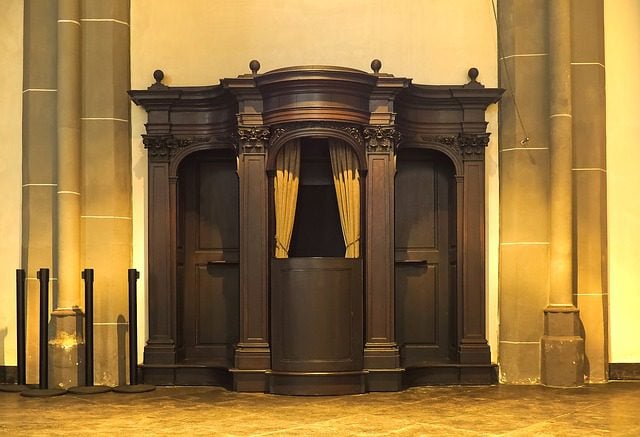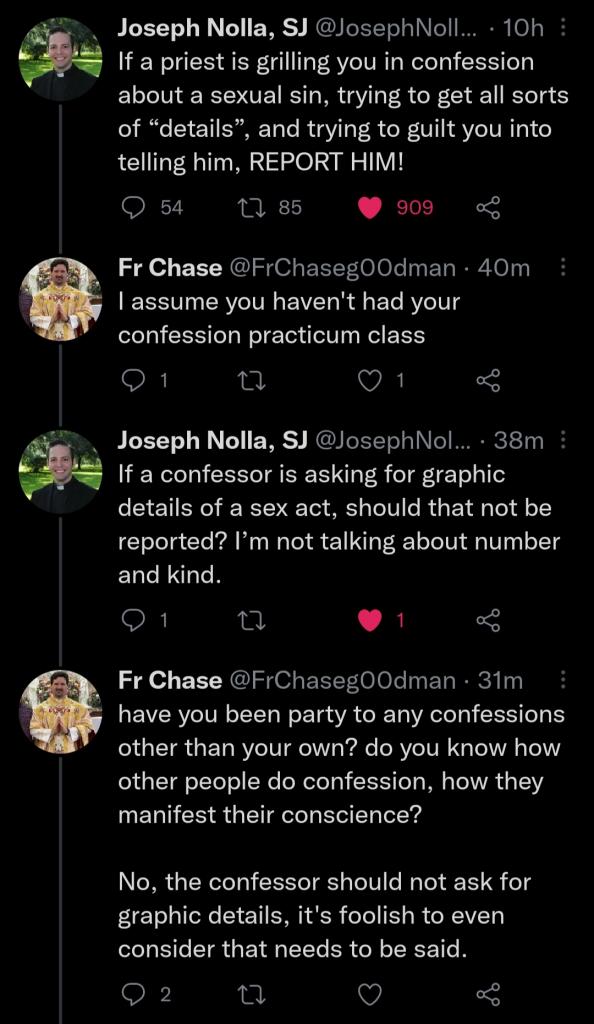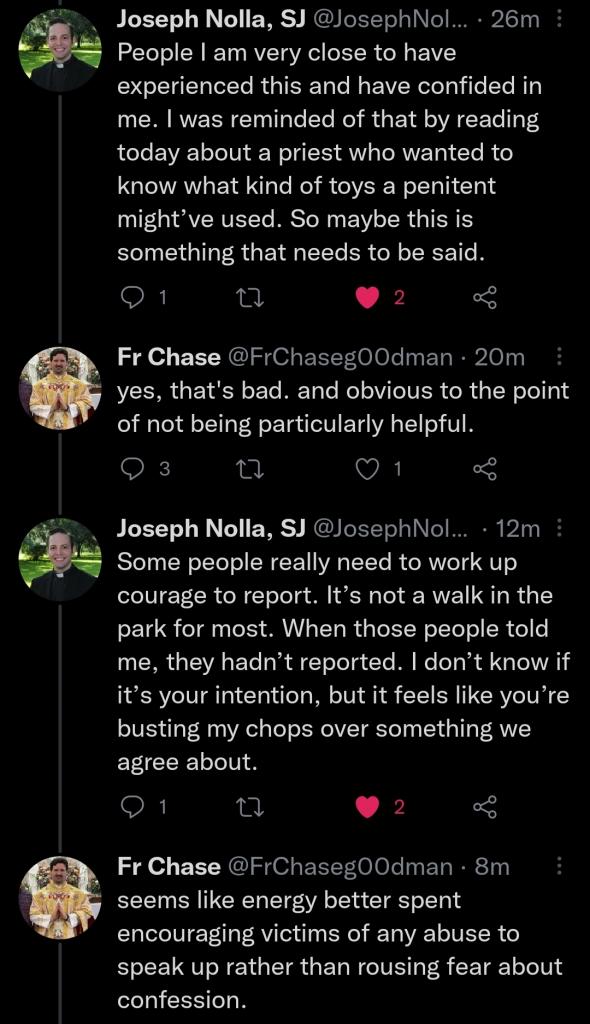
A friend mentioned online that she had been sexually harassed in the confessional.
She didn’t call it that but that’s what it was. She confessed a sin of a sexual nature. The priest asked “are you a toy?” and badgered her to try to give details about the event and to admit she was raped (she wasn’t). He insisted on knowing details. She felt helpless and argued with him instead of leaving. Apparently, she didn’t know that she could walk out.
In case any of my readers don’t know: you’re allowed to do that. You can always walk out of the confessional if a priest is being inappropriate. That’s not disrespecting the sacrament. The priest who’s making you so uncomfortable is disrespecting the sacrament. And if he’s making comments or asking questions that aren’t to do with the sacrament, that’s not a sacrament at all. He’s just harassing you. You are allowed to walk out of the confessional, and what’s more you should. You can even say “THAT’S SEXUAL HARASSMENT, FATHER SO-AND-SO” loudly enough to be heard in line, and then walk out of the confessional. And then you should try to report the priest to the diocese, and go to confession to somebody else.
Further, in case my readers don’t know: you’re not supposed to give unnecessary details when you confess your sins, and most details are unnecessary. You just have to confess what you did, and the number of times you did it if you’re sure it was a mortal sin. If you’re unsure whether something is a mortal sin, it’s not a mortal sin, because a mortal sin requires you to have full knowledge that it’s mortal and to give full consent. You’re supposed to just say “I sinned mortally against the sixth commandment three times and venially several times” or “I committed fornication and I can’t remember how many times but I’m sorry for all of them” or “I entertained an impure thought on Tuesday,” something like that. You don’t have to say whether it was homo or heterosexual, you don’t have to describe the encounter, you don’t have to talk about how it made you feel, nothing like that. If a priest asks you to describe the sex act you committed, that’s nothing to do with the sacrament, that’s just sexual harassment. He’s using you to pleasure himself.
In any case, my friend posted about her experience on Twitter, because she was trying to find out how to report him. And a lot of the responses were good. Most people rushed to tell her how sorry they were that this had happened and to help her figure out how to report it.
A lot of people, overwhelmingly women, began chiming in with their own stories about being sexually harassed or just yelled at and verbally abused in the confessional. Certain priests chimed in to express their horror that others were treated that way and even to tell about the times they’d had to stop a priest who was yelling at penitents. People shared their grief that loved ones had left the church over emotionally and spiritually abusive experiences in confession. You’d have to be silly to think that spiritual abuse in confession is rare, but it’s sometimes overwhelming to see just how common it is. No, it’s not the same as sexual battery and other horrific things that are easier to identify as “abuse.” But it’s still abuse, it’s still gravely wrong and traumatic, and it’s still a sacrilege when a priest hurts people while acting in persona Christi.
And then there were the other responses.
A seminarian who tweeted warning people to report priests who abuse in this way, was chided by a priest for “rousing fear about confession.”


It’s 2021, and we’re still being encouraged not to speak up about abuse, for fear that we (and not abusers) will scare people away from the sacraments. Priests still think that. Not all of them, thankfully, but some do and they’re not ashamed to proclaim it in public.
And my friend did get quite a few comments chiding her for speaking out about the abuse, in among the support. She was advised to forgive the priest and pray for him rather than reporting him. She was told the priest might be just having a bad day and she ought to pray to Saint Pio. She was even accused of “breaking the seal of the confessional” which, for the record, a penitent can’t do. The seal applies to the priest and to someone who accidentally overhears. You can say anything you want about what happens to you in your confession. You have every right to do that if you wish. People were spewing the same clericalist nonsense we’ve been hearing with every story about an abusive priest for as long as I can remember.
I’m encouraged that so many people felt free to talk about their experiences in confession. And I’m encouraged that so many priests had the correct response: anger on her behalf and helping her to report.
But I’m frustrated beyond measure at the people who continued parroting those same victim-blaming lines that have shielded abusers for as long as I’ve been Catholic.
Nothing is going to change if we don’t let the lies go.
I don’t honestly know if things can change at all. But at minimum, they’re not going to change while people still shame those who speak out against abusive priests. They’re not going to change while priests think talking about abuse, and not the abuse itself, scares people away from the sacraments.
The priests who abuse have to be stopped, and that won’t happen unless their enablers in the clergy in the laity repent.
Repentance is supposed to be what the sacrament is all about, and not this nonsense.
Image via Pixabay
Mary Pezzulo is the author of Meditations on the Way of the Cross and Stumbling into Grace: How We Meet God in Tiny Works of Mercy.
Steel Magnificat operates almost entirely on tips. To tip the author, visit our donate page.













